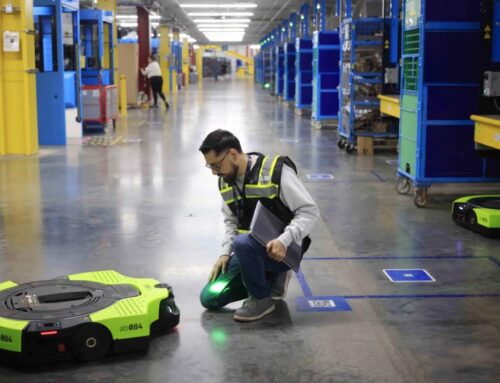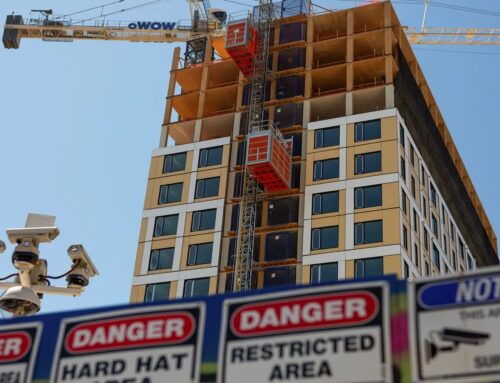Last-minute California budget includes sweeping environmental law rollbacks
June 30, 2025
In summary
Major changes to the California Environmental Quality Act include an exemption for high-tech industrial plants and other projects. The move, fast-tracked under pressure from Gov. Gavin Newsom, sparked fierce pushback from environmental, community and labor groups.
California lawmakers today approved one of the most substantial rollbacks of the state’s signature environmental review law in decades, including a controversial exemption that would allow high-tech manufacturing plants to be built in industrial zones with no environmental review.
The changes to the California Environmental Quality Act were embedded in a last-minute budget bill that sailed through the Senate and the Assembly. The new law exempts nine types of projects from environmental reviews: child care centers, health clinics, food banks, farmworker housing, broadband, wildfire prevention, water infrastructure, public parks or trails and, notably, advanced manufacturing.
Aiming to streamline and lower the cost of construction in California, the new law also restricts legal challenges under CEQA by narrowing which documents courts can consider. It also allows limited environmental reviews of projects that don’ t have an array of impacts.
The changes in the 54-year-old law were forced by Gov. Gavin Newsom, who told legislators last week that he would not approve the state’s $321 billion spending plan without them. A provision in the budget act approved last week stated the spending plan “shall be inoperative and repealed” if changes to the state’s environmental review process were not final by midnight tonight.
Newsom signed the bill tonight, after it passed with overwhelming votes in the Senate and Assembly.
For decades, business and building groups have railed against what they call “CEQA abuse,” saying the environmental reviews drag out projects for years. But supporters say the law requires developers and others to examine and correct an array of environmental impacts, from air pollution to water use to traffic.
Recently, with climate change front and center, some liberals have joined calls for overhauling the environmental law, arguing that California must build faster and at scale to decarbonize its electric grid and construct housing and transportation systems.
The new exemption for “advanced manufacturing” facilities in areas already zoned for industrial use — including plants that build semiconductors and nanotech — drew some of the fiercest criticism. State law defines the category as processes that improve or create new materials, products or technologies.
The changes were met with vehement opposition from more than 100 environmental and community groups, which said industrial plants will be more easily built in low-income communities. They also say the exemptions will advantage developers by limiting public oversight and could create legal confusion.
“This bill is the worst anti-environmental bill in California in recent memory,” a coalition of opponents, including the California Environmental Justice Alliance and the Western Center on Law and Poverty, wrote in a letter to Newsom and legislators.
“This law would not harm all California communities equally. This budget deal is an attack on lower-income communities of color that consistently get sited for harmful industrial projects.”
ASHA SHARMA, LEADERSHIP COUNCIL FOR JUSTICE AND ACCOUNTABILITY
At the over three-hour hearing preceding the vote, dozens of members of the public spoke in opposition, with some holding signs saying “When CEQA is silenced, polluters speak louder.”
Asha Sharma, state policy manager with Leadership Council for Justice and Accountability, called the changes “a back-room, last-minute deal” that made the state budget “dependent on gutting environmental review for resource-intensive and polluting industrial projects.”
“This law would not harm all California communities equally,” Sharma said. “This budget deal is an attack on lower-income communities of color that consistently get sited for harmful industrial projects.”
The Assembly approved the bill with a 50 to 3 vote, and the Senate, 33 to 1.
Assemblymember Al Muratsuchi, a Democrat from Torrance who voted against it, raised concerns on the Assembly floor about the bill’s exemption for advanced manufacturing plants, citing the environmental opposition and urged the measure to be revisited.
The lone senator to stand against it was Republican Roger Niello from Roseville. However, several who voiced concerns about the bill in an earlier hearing today did not vote, including Democratic state Sen. Catherine Blakespear from Encinitas and Sen. John Laird from Santa Cruz.
Newsom said his budget maneuver was necessary and thanked the leaders of the two houses of the Legislature.
“This was too important to play chance. It was too urgent, too important to allow the (legislative) process to unfold as it has for the last generation, invariably falling prey to all kinds of pratfall,” Newsom said.
The governor’s public comments were limited as the fierce debate broke out in recent days. But his press office account posted on social media last week that “the Legislature has a chance to deliver the most significant housing and infrastructure reforms in decades.”
“This is our moment to build the California Dream for a new generation,” his office said. “We’re done with the roadblocks and delays — let’s get this done.”
“This is a bill that, literally, will help us get more housing, more childcare centers, more health centers, more food banks, and bring clean advanced manufacturing to California.”
STATE SEN. SCOTT WIENER
A major proponent of the exemptions, State Sen. Scott Wiener of San Francisco said in an interview with CalMatters today that criticisms by environmentalists were “extreme, unfounded, melodramatic statements.”
“This is a bill that, literally, will help us get more housing, more childcare centers, more health centers, more food banks, and bring clean advanced manufacturing to California,” Wiener said. “And to suggest that that kind of bill is bad for the environment — or the worst environmental bill in decades — or whatever it is they said, that’s just over the top.”
Wiener said the changes exempt manufacturing projects only on land that is already zoned as industrial. The goal is to make it easier for high-tech industries to build, with Wiener arguing that California risks losing out on major private-sector investment because it’s too costly and difficult to build in the state.
“The environmental movement needs to ask itself: Why is it that CEQA keeps getting used to stymie climate action, whether it’s transit-oriented development or bike lanes or public transportation or phasing out oil?” Wiener said.
Several housing advocacy and business groups voiced support for the law today.
Alex Torres, speaking on behalf of housing groups, the tech trade association Chamber of Progress, the Bay Area Council and others, said exempting advanced manufacturing from environmental review will help “the Bay Area’s competitiveness” and “shift some manufacturing opportunities to the Bay Area.”
Several other manufacturing groups declined to comment to CalMatters about the law changes or did not respond to inquiries.
The debate today in the committee hearing included a testy exchange between senators about whether Newsom was forcing their hand.
“We have a situation here where the executive branch is telling the Legislative branch that if it doesn’t pass this trailer bill, that the budget itself will be null and void. I have to say, that profoundly disturbs and offends me,” state Sen. Roger Niello, a Republican from Roseville, said at today’s hearing.
Wiener fired back that all aspects of the budget and trailer bills were a three-party agreement. “We don’t have a dictatorship,” he said.
“I wasn’t part of that three-party agreement,” Niello countered.
Environmental and community groups also questioned the use of the budget to shortcut the legislative process, limiting public and legislative input.
“If the only way you can change state law is to keep it out of the public eye as long as possible, and condition passage of the state budget on the proposed changes, does that not show that its backers know the public wouldn’t support it if they knew the truth?” the coalition of opponents wrote to Newsom and legislators.
California lawmakers enacted CEQA in 1970 amid a rising tide of environmental awareness. It had broad bipartisan support: Gov. Ronald Reagan signed it into law, and President Richard Nixon approved its federal counterpart the same year. At the time, environmental concerns were mostly local — unchecked development, polluted waterways, pesticide use and the loss of open space.
Two years ago, in another effort to use the state budget process as leverage, Newsom proposed a series of last-minute changes to the law. That move was rejected by lawmakers.
But after years of failed attempts to rewrite the law, Democrats have begun to rally around a new message: The political conversation among Democrats in Sacramento, and across the U.S., has shifted following last year’s presidential election, with growing consensus that removing regulatory barriers is a top priority.
Still, just hours before their vote, lawmakers were grappling with how exactly the bill would affect communities on the frontlines of manufacturing, with Wiener fielding most of the questions.
State Sen. Caroline Menjivar, a Democrat from Van Nuys, asked about the definition of “advanced manufacturing.” Laird, a Democrat from Santa Cruz, asked whether it included nuclear materials. Wiener said it did not.
“It is a horrible day when a senator even has to ask if an exemption from environmental review includes nuclear manufacturing,” said Sharma, of the justice and accountability organization.
At the earlier committee hearing, State Sen. María Elena Durazo, a Democrat from Los Angeles, cited the massive cleanup of lead-contaminated soil around the battery recycling facility Exide Technologies in Vernon as a warning of the risk.
“I don’t believe anyone here thinks that we use CEQA in any way other than to protect ourselves. The toxins…can leach into neighborhoods and devastate full communities.”
RAQUEL MASON, CALIFORNIA ENVIRONMENTAL JUSTICE ALLIANCE
Raquel Mason, senior legislative manager with the California Environmental Justice Alliance, told senators that there have been 23 Superfund sites in Santa Clara County — in the heart of Silicon Valley, and several are related to semiconductor manufacturing.
“I don’t believe anyone here thinks that we use CEQA in any way other than to protect ourselves,” Mason said. “The toxins don’t just stay in the industrial zone facility. They can leach into neighborhoods and devastate full communities.”
Samuel Appel, policy director at the United Auto Workers in the Western United States, which represents 100,000 workers in California, said the exemption for advanced manufacturing was especially alarming because of California’s position as a leader in the tech industry.
“We’re concerned not only about toxic work sites that our members will be working at and organizing in. We’re concerned about the toxic communities that we’d be living in,” Appel said. “We are organizing and work in these facilities every day — at Tesla, in semiconductor facilities and in lithium and the lithium extraction industry and in aerospace. This is a giveaway for corporations, and city and local control is not enough to protect us or our communities.”
A new law signed by President Joe Biden in 2022 offers $280 billion in federal initiative aimed at boosting U.S. innovation and manufacturing in strategic technologies, especially semiconductors. The law allocates ubsidies and tax credits to incentivize companies to manufacture chips in the United States, rather than overseas.
Semiconductors are the tiny processors that power everything from smartphones and electric vehicles to fighter jets and satellites — and demand for them is growing. The pandemic exposed major vulnerabilities in global supply chains, spurring bipartisan momentum to reinvigorate chip production.
Arizona, Texas and Ohio have landed many new chip fabrication plants, in part because of lower costs and fewer regulatory hurdles. That’s why some lawmakers, including Wiener say environmental streamlining is needed if California wants to attract a significant share of manufacturing dollars.
“These are jobs of the future, there’s going to be more and more of these jobs, and I want them to be in California,” Wiener told CalMatters. “We do so much of the innovation here and the creation of this technology. I want us to benefit from the technology in terms of growth and job creation here and so, you know, I think this is a reasonable bill.
The measures lets certain projects skip a full environmental review if they just barely miss qualifying for an exemption — for example, if they meet every requirement except one. In those cases, the review would only look at the environmental impact of that one issue, instead of analyzing the whole project. Critics say it’s confusing and could weaken protections by letting potentially harmful projects avoid deeper scrutiny.
“We find the near-miss provisions to be extremely legally confusing,” said Matthew Baker, policy director at the Planning and Conservation League. “It would take a lot, probably, for the courts to sort out. We simply don’t really understand how it would work.”
Under CEQA, lawsuits challenging a project require the agency to provide a full record — including internal emails and staff notes — but the changes exclude those internal communications from the record, except for projects involving distribution centers or oil and gas infrastructure. Critics said that will make it harder to challenge potentially harmful projects.
Search
RECENT PRESS RELEASES
Related Post






